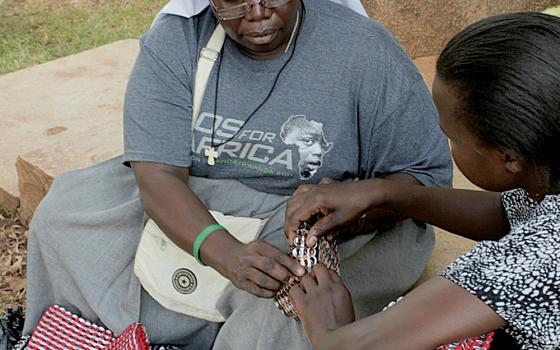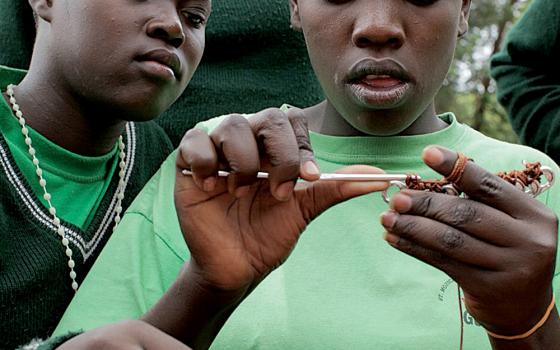Sr. Rosemary Nyirumbe is on the last pages of her fifth passport, having filled the pages of the four previous passports with stamps from around the world. The Sacred Heart of Jesus sister is practically on a first-name basis with the American Embassy in Kampala, Uganda, which doesn't ask any questions before reissuing her visa. Her fall travel schedule took her to Poland, the United States, Italy, Uganda for a quick meeting with her congregation, and then back to Belgium for an honorary doctorate.
Nyirumbe, former director of the St. Monica's Vocational School for Girls in Gulu, is perhaps Uganda's most famous sister. She's a regular on international talk shows, was a CNN Hero in 2007 and was one of Time magazine's 100 Most Influential People in 2014.
There's a book about her and a documentary narrated by Forest Whitaker that traces her work rehabilitating female child soldiers from Joseph Kony's Lord's Resistance Army. These girls, kidnapped at a young age, were forced to carry out atrocities against their own village, and many were forcibly married to Lord's Resistance Army commanders. When they escaped from the bush, their communities shunned them. Nyirumbe has been part of the reconciliation effort to help empower these young women, often through creating the school's signature "pop-top bags," to be economically empowered as they begin to heal the emotional wounds.
Global Sisters Report caught up with Nyirumbe during her brief stopover at her community in Gulu to talk about what it's like to be a famous nun.
GSR: Why do you think your story and the story of the girls at St. Monica's have echoed so much around the world? It's a rural area in a country far away. Why are people so touched?
Nyirumbe: It's simple. We're talking and explaining about our approach [to deeply traumatized communities], and the answer is so simple: involvement. The most important thing in attempting to heal people is to be present. Be in their situation, show them, teach them how to love. Love their children, even if they are children from conflicts, children from their own captors. I think people are attracted to the simplicity.
People are fascinated to hear about what happens in northern Uganda because we are sharing our lives with people whose backgrounds are from two different sides of the conflict. Sharing in that life has become an education. We are practically embracing this way of life.
Given your experience at St. Monica's, what advice do you have for other sisters working in recent conflict areas where the communal wounds are still so raw?
Sisters in conflict zones should get more into networks and speak to each other more. Because, to tell you the truth, we sisters work in isolation. I know it's very difficult, and we all struggle. But I'm sure that every one of us has something to offer. If we had an opportunity to meet, I'm sure we could learn from one another.
I want sisters to understand the importance of partnership. Many times, we say, "It's too hard to get involved or start something" because we don't have the help or funding. We need to look for partners, we need to network. Sisters, let us not say we cannot start something, we cannot do something because we have no support or financial problems. We will always have financial problems. But it shouldn't stop us from starting to move on as women.
Is it difficult to be a sister in the spotlight?
I don't care about being famous; it doesn't change me. I remain exactly who I am, and when I come back to the community, you would hardly know [that I'm famous]. What I know is that I am there representing, I am there speaking on behalf of people who cannot speak for themselves.
I always say that if people look at me as someone famous, being famous is only a springboard to let me be able not just to speak, but to shout, to be able to raise issues that no one else can. As sisters, there are some forums we don't usually reach. So if I can reach these forums, I am very happy. If you look at me, Sister Rosemary, you have to know there are many more Sister Rosemarys who are working in many places.
When I have visitors or volunteer doctors, I always send them to different communities where sisters are working to show that it's not just about me. I represent many people. And I want to represent my sisters.
How has your public persona helped St. Monica's and your work?
It has helped quite a lot. Now, partners come to us. I can look for partners rather than struggling to write grants to fund this project or do evaluations. I invite people to come and see what their support can do. I bring a lot of people here, which brings more support.
We started another school and an orphanage with attached primary school and 10 dormitories. We bought 100 acres of land to start a sustainable agricultural school because it's important for rural women to realize they can contribute to food security through agriculture, which is the backbone of the economy of this country. The more I travel, the more I meet people, and the more they want to take it up.
Often, sisters from this region tell us at GSR that they don't want to be interviewed. They say, "I don't want to draw attention to myself. Talking about my work isn't humble."
That's not humility. That's really just stopping the world from knowing about your work. Speak! When you speak about yourself, it will reflect on what others are doing. Because you are never alone; we're a community. If I die, all this work will continue because sisters are involved, and all the sisters are doing it together. It's a community! So when I speak out, or when another sister speaks out, it's not talking about yourself. It's about what your community does.
We are badly taught if we don't speak. If we don't speak, people won't know about us. If I go out to speak as Sister Rosemary, that's not right. But if you read my interviews and talks, you see I say, "I'm Sister Rosemary of the Sisters of the Sacred Heart Congregation." This is how I'm trying to execute the charism of the congregation. I know I may not be doing it perfectly, but I'm trying my best to let my identity be as a Sacred Heart sister. I'm trying to keep that identity as a nun. It doesn't matter what forum I'm in. You'll find I'm dressed just like this.
So why shouldn't I talk about what sisters do? Why shouldn't I invite them to see our work? Even our difficulties? Even our shortcomings?
That's why having partners is very important. A lot of people say that sisters are closed. If we don't open our houses to people, how will they know about our life? How will they know how to walk alongside us and support us?
I have learned over time it is very important for us sisters, as leaders, to open up to people. Because these people are our immediate support. We need to explain to them how we work, what are our challenges, what are our successes. Since time immemorial, sisters have been deeply involved in education, but we are also growing and doing so many good things. We need to talk about that.
[Melanie Lidman is Middle East and Africa correspondent for Global Sisters Report. She is based in Israel.]



